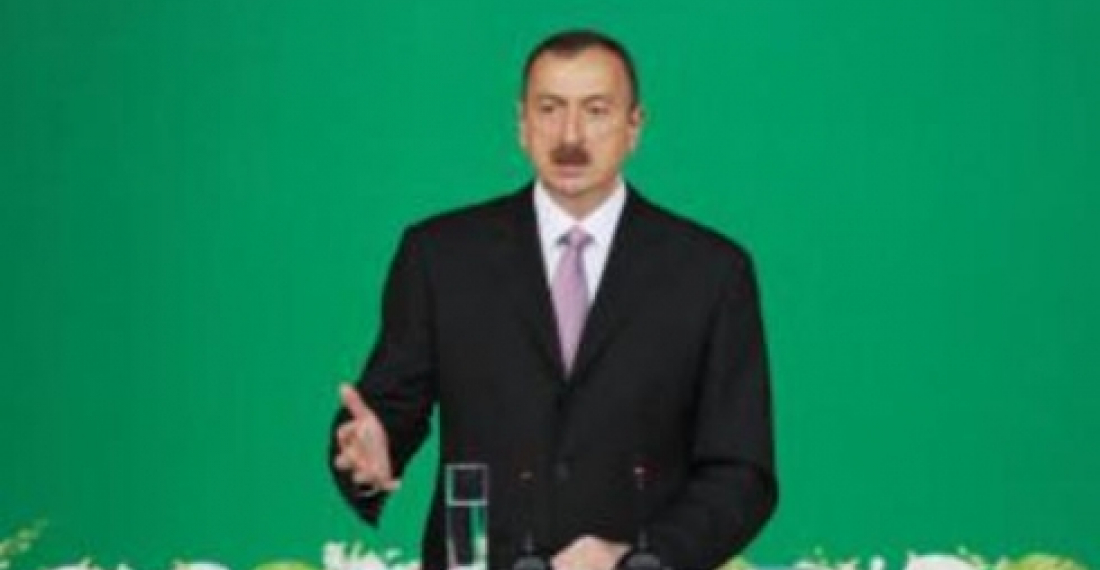The President of Azerbaijan Ilham Aliyev has set out his country's view of the current state of affairs with regards to the Nagorno-Karabakh conflict. The President was speaking at an official reception to mark Azerbaijan's National Day, 28 May.
Aliev accused Armenia of ignoring the rules of international law, not following the statements of the Heads of Minsk Group co-chair-states, wanting to keep the status quo intact as long as possible, and behaving insincerely in the negotiations. The President said that numerous efforts of Azerbaijan remained without response.
The President said, "As you know, Azerbaijan has given its consent to the updated Madrid principles proposed by the Minsk Group in late 2009. Azerbaijan considered that these principles can become the basis for a comprehensive peace agreement. Azerbaijan suggested that we must prepare a major peace agreement without delay and waste of time. Armenia had declined these offers, and thereafter mobilized all possible means to create and strengthen this stagnant situation in the negotiations".
Ilham Aliev added, "Azerbaijan is the most interested party in the settlement of the issue. Armenia is simply trying to gain time. If their politicians take into account the interests of Armenia, they would see that delaying time will plunge them into an even more difficult situation. But despite this Armenia has opted for delaying tactics and wants to hold negotiations for the sake of negotiations".
President Aliyev said that the mediators mainly focus to maintain the cease-fire. "We also want to maintain the cease-fire. But at the same time we want to restore our territorial integrity and demand it. International law requires it. UN Security Council resolutions, decisions and resolutions of other organizations require it. So here Azerbaijani interests differ to some extent. We also want to have peace. We also want that the issue to be solved by peaceful means, but to be solved. Armenia does not want to address the issue; I say again, Armenia wants to preserve the status quo as long as possible. The mediators, unfortunately, are more engaged in strengthening confidence-building measures, stabilization of the situation on the contact line of troops and other issues not directly related to the essence of the negotiations. This situation is intolerable, unacceptable and must be changed. If negotiations are conducted, they should be conducted on the essence of the issue. The essence- our territorial integrity, recognized by the international community, must be restored, the occupying forces should be withdrawn from the occupied territories and Azerbaijan must restore its territorial integrity".
The Azerbaijani President also talked about the future of the people living in Nagorno Karabakh, and people who will return there after the settlement of the conflict. "In the world, there are positive experiences of autonomy, including positive experiences on the European continent. Without going beyond the scope of this experience, the principle of self-government may find its solution". Ilham Aliyev stressed that Nagorno-Karabakh - it is primordial and historical Azerbaijani territory. It was before, so is now and so it will be in the future. "On the issue of the territorial integrity of Azerbaijan can not be and will not be the slightest concession.
In fact, there are not so many choices. Either way is the military or peaceful! We are ready for both options. We have never ruled out the military option. International law, the UN Charter recognizes the possibilities of self-defense, and Azerbaijan may at any time carry out any operation on the territory recognized by the international community as the territory of Azerbaijan. But for now we try our best to solve this issue peacefully. I believe that the opportunities in this direction have not been completely exhausted. We need to further intensify our efforts to resolve the issue quickly, fairly and peacefully. We have to grow and become even stronger in foreign policy, domestic policy, and economic spheres and so do we".
The President said that Azerbaijan must continue to keep Armenia in isolation from all international projects. "This tactic and policy are bearing fruit. According to official statistics, annually 80-100 thousand people leave Armenia. They leave forever. In this country, there is the growing trend of depopulation, a demographic crisis. And this crisis will gradually deepen, as the more able-bodied people leave out and there are fewer opportunities to revive the economy. As for the revival of the economy, there are no such prospects. There is a complete period of stagnation.
We must redouble our efforts to strengthen our country. We must and we will keep Armenia in the isolation. We must use every opportunity to gain a greater potential. It is also the military potential. Today Azerbaijani army is the strongest army in the South Caucasus. We have repeatedly demonstrated that, demonstrated at the military parades, will demonstrate once again". "Our foreign policy is bearing fruit. The final declaration, signed with an absolute majority of the heads of states, with whom I met in a bilateral format over the last ten years, reflects the principles of territorial integrity of Azerbaijan", stated the Azerbaijani President.
source: commonspace.eu with agencies
photo: Ilham Aliev speaking in Baku on the eve of Azerbaijan's national Day.







